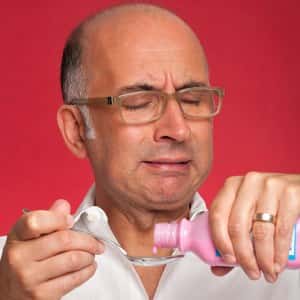
Pepto-Bismol has been around for more than 100 years. The original formula was developed by a physician to treat severe diarrhea brought on by cholera. He sold his invention directly to other doctors. When he couldn’t keep up with demand he enlisted the Norwich Pharmacal Company in Norwich, New York. It manufactured and distributed the pink liquid. The formula was eventually changed to include bismuth subsalicylate, the active ingredient you will find on the bottle today. It has an interesting property. It turns brown stool into black poop. Some people find this “side effect” alarming:
Q. If Pepto-Bismol causes black stools, what does it mean? Should I take something else for upset stomach?
A. Pepto-Bismol (bismuth subsalicylate or BSS) is a popular medicine for upset stomach and diarrhea. It frequently leads to black poop, but that is expected. You may also find that your tongue turns color as well.
Why Does BSS Turns Brown Stools into Black Poop?
The bismuth in Pepto-Bismol interacts with sulfur in both saliva and stool to form bismuth sulfide. That leads to black poop. It is not dangerous.
If you had black stool without taking Pepto-Bismol or any other medication with bismuth, you should see your doctor promptly. Black tarry stools can result from intestinal bleeding.
Usually it is fine to take Pepto-Bismol for a few days, but it should not be taken long-term. Too much bismuth can lead to problems. If your digestive difficulties continue for a longer time, they deserve medical attention. It can take a few days after discontinuing Pepto before stool returns to its normal color.
Pepto-Bismol for Travelers’ Diarrhea:
It probably comes as a surprise for most people to learn that the familiar pink liquid that is used to treat “overindulgence,” upset stomach, indigestion, nausea and heartburn can help prevent travelers’ diarrhea (TD). “Guidelines for the Prevention and Treatment of Traveler’s Diarrhea: A Graded Expert Panel Report” was published in the Journal of Travel Medicine (April 1, 2017). Under the Heading “Prophylaxis” is one recommendation:
“Bismuth subsalicylate (BSS) may be considered for any traveler to prevent travelers’ diarrhea (Strong recommendation, high level of evidence).”
The authors go on to state:
“There is strong evidence to recommend the option of using bismuth subsalicylate (BSS) for prophylaxis of TD in travelers. There have been three sound RCTs [randomized controlled trials] using BSS vs placebo in travelers where BSS was shown to have a strong protective effect (>60%). BSS has been studied using either 2.1 g [grams]/day or 4.2 g/day in 4 divided doses (with meals and at bedtime), and has been studied in both the liquid and tablet forms. A lower dose of 1.05 g/day has also been shown to be preventive, though it is unclear whether it is as effective as the higher doses.”
Side Effects of Pepto-Bismol:
The authors of the guidelines for preventing travelers’ diarrhea report that side effects may include:
- Black Tongue
- Black Stools
- Tinnitus (ringing in the ears)
- Possible constipation
- Interaction with some medications
They also caution pregnant women to avoid BSS. People who are allergic to aspirin or salicylate should also avoid BSS. And anyone with reduced kidney function should probably steer clear of the Pepto-Bismol.
Pepto-Bismol For Gas:
Did you know that Pepto-Bismol can also be a solution for obnoxious odors? Flatologists (yes, there is such a specialty and they do study farts) at the Minneapolis Veterans Affairs Medical Center discovered that bismuth subsalicylate provided “effective therapy for flatus odor.”
They discovered that Pepto reduced colonic hydrogen sulfide by more than 95 percent. We would not take Pepto-Bismol on a regular basis, however. Too much absorption of the mineral bismuth can lead to bismuthism, which is not a good thing. Symptoms of bismuth poisoning include nausea, vomiting, stomach pain, diarrhea, mouth ulcers, skin rash, and kidney damage. So, please be moderate in your use of it and follow the instructions on the label.

